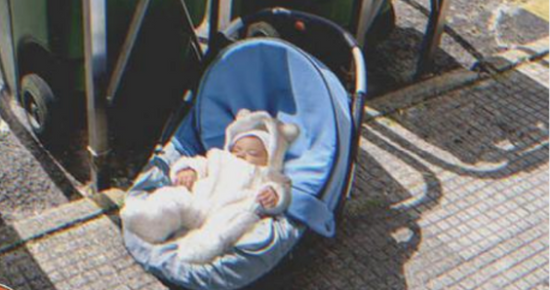The human capacity for betrayal is often met by a reciprocal, profound capacity for unconditional kindness. The life of Bob, a man struggling to define himself as a devoted father while grappling with devastating personal rejection, is a powerful illustration of this duality. Bob, a trashman attempting to raise his twin children alone after a sudden abandonment, faced immense adversity. Yet, when fate presented him with a defenseless, abandoned baby, he chose profound compassion. This act of selfless love would, years later, lay the groundwork for a multimillion-dollar business, proving that the truest riches are built not on blood, but on a foundation of fierce, unwavering dedication.
The story of Bob and his eventual success is not just about financial prosperity; it is about the transformative power of acceptance. He chose to take in a blind baby found next to a dumpster, and by coincidence—or rather, by divine design—he eventually discovered the boy’s talent, helping him lay the foundation for his eventual, powerful endeavor that would enrich both their lives and the lives of thousands of others.
I. The Trauma of Betrayal and False Fatherhood
Bob believed he had the perfect life with his wife, Sarah. He saw their early years defined by shared dreams and the joy of raising their twin daughters, Kara and Christie. However, his reality was built on a nine-year-long, agonizing lie.
The Revelation of Infidelity
The shock began when Sarah informed Bob that she had been seeing another man for a considerable amount of time and was leaving him to care for the girls alone. Not everything, however, was as it seemed. Bob, shattered, challenged her assumption: “Is their father your ‘other man’? Sarah, how could you have done this to me? Tell the truth to me.”
Sarah’s response delivered a second, more devastating blow. She acknowledged that Kara and Christie were not the children of Sarah’s affair partner. She confessed that she had cheated on Bob two years after they were married, and that the man who fathered the twins had passed away years ago.
The Cruel Reason for Abandonment
When Bob, utterly destroyed, asked her why she had cheated on him and shattered their life, her answer was a cold indictment of his profession and his worth: “Because you scavenge the dumpsters for a living, and I’m ashamed to say you’re my husband. You cannot afford the luxurious life I desire.”
Bob’s core identity—the hard-working provider—was decimated. It took him nine long years to learn that his cherished and worshipped wife was unhappy with him and secretly ashamed of his honest labor. This revelation fundamentally destroyed his ability to look at his daughters the same way, even though he knew he could not survive without their presence.
The Finality of the Choice
On the day of their divorce, Bob posed one last, agonizing question: “Are you taking the kids with you?”
Sarah’s response was chillingly decisive and entirely devoid of maternal instinct: “Why would I bring the kids along when I’m planning a different kind of marriage? Their biological father passed away years ago, so you can raise them if you so choose.” Bob never saw her again after she walked out.
Despite the deep wound of the betrayal and the knowledge that his fatherhood of the twins was not biological, Bob made the immediate, selfless commitment to raise his daughters. He knew he was their father in every meaningful sense. He felt as though this was what fate was calling him to do. Through it all, he battled every day to provide his girls with joy, believing them to be his entire universe—not realizing that there would soon be a new, unexpected addition to his small, struggling family.
II. The Act of Compassion: A Child in the Dumpster
One ordinary day, while Bob was diligently gathering trash close to his regular dumpster route, his routine was violently shattered by the sound of a screaming abandoned infant boy. “A baby?” he questioned in profound disbelief, approaching the small, defenseless youngster.
He turned to face the vast, uncaring space around the dumpster. Leaning down, he examined the baby’s carrier and found a brief, heartbreaking letter that simply read: “To whoever finds this blind baby, please take care of him.”
Bob looked at the scene in utter shock. “How could someone harm a baby in this way?” He gently took the infant in his arms and held him close. The baby, sensing the new touch, continued to cry and wriggled his delicate hands in an attempt to feel who was holding him. After calming the tiny youngster, Bob took the infant home, gave him some warm milk, and immediately called child services to report the abandoned child.
Adoption and the Promise of Love
The baby boy was later brought to the hospital, where it was definitively determined that he was blind. Bob’s heart went out to the defenseless little child. He felt an intense, immediate connection and a powerful protective instinct. He chose, without hesitation, to adopt the baby. “I can raise him too if I can raise two daughters on my own,” he reasoned, embracing the challenge.
Six months later, after formally adopting the infant, Bob brought him home. He introduced his new son, whom he named Sam, to his daughters: “He’s your new younger sibling, Sam. How do you feel?” Sam was now an officially recognized part of their unconventional family unit.
Bob knew that raising a blind child would present unique challenges, demanding additional care and attention, but he committed himself fully to making Sam feel loved, secure, and accepted. He made a vow to himself to provide Sam with every opportunity he could manage.
III. The Discovery and the Multimillion-Dollar Vision
For Bob, the years that followed were dedicated to providing a simple, happy life for his three children. It took seven years for Bob to stumble upon the key to the boy’s specific, unique interest—an interest that would eventually define his life.
The Bedtime Story Catalyst
Bob had always been a father who used his imagination to battle the harsh realities of their life. Every night, he told bedtime stories to a giggling Sam, whose imagination, unburdened by sight, was vivid and powerful. Sam’s favorite stories conjured up images of a lovely princess hidden in a massive tower, with a dashing prince surreptitiously meeting her. Sam never went to sleep without enjoying one of these nightly bedtime stories.
For Sam’s seventh birthday, Bob, wanting to give him a special gift, presented him with a book. Sam, blind and unused to the familiar texture of paper, was confused: “Daddy, what is this?” Sam enquired. “Touching it feels so strange.”
Bob explained the miraculous new world he was giving his son: “It’s a book in Braille. You have to feel the elevated dots and move your fingers carefully in that direction. They will assist you in reading and learning.” Over the next few weeks, Bob patiently and carefully taught Sam how to use the book, recognizing the boy’s intense fascination with the tactile letters.
The Foundation of Fortune
Every two months, despite his meager income, Bob would save and sacrifice in order to purchase a few new Braille books for Sam. They were expensive, and Bob would have to give up certain necessities to purchase them for his son. This relentless dedication to Sam’s literacy was the seed of their future success.
Sam absorbed the knowledge rapidly. He could read and write easily even after twenty years, developing a powerful connection to language and literature. He recognized the immense barrier that the lack of accessible books created for the blind community. Driven by a desire to help others like him, he decided to found a tiny publishing firm specializing in creating and distributing accessible reading material.
Bob, seeing the passionate potential, stepped in again. He helped Sam purchase the supplies needed to get things moving with the only money he had saved: the money he had diligently set aside for his daughters’ weddings.
The Multimillion-Dollar Success
Sam’s vision was timely and necessary. With time, his business started to rapidly increase its reach. He was able to drastically raise his family’s standard of living and fulfill his commitment to making profound contributions to society with his newfound wealth.
Three years later, Sam was the owner of a large publishing company that specialized entirely in teaching literacy and providing resources to blind individuals. His business generated millions of dollars in sales. He used his first million dollars to move himself, his sisters, and his adoptive father into an opulent mansion—a world away from the dumpsters where he was found.
IV. The Lessons of True Fatherhood
Despite not being Bob’s biological son, Sam made him proud in every single way. Sam’s commitment to his father was absolute. In interviews, he often claimed to be fully aware of his adoption and proud of his origins.
The story provides two profound lessons for everyone:
Kindness Transforms Destiny
Someone’s life can be utterly transformed into something they genuinely deserve by a single act of profound kindness. Despite his own challenges and emotional turmoil as a single father, Bob chose unconditional love, taking in and adopting a blind baby he found abandoned near the dumpster. Bob’s generosity, sacrifice, and fierce dedication made the boy’s future prosperous and successful, proving that compassion is the greatest investment.
Fatherhood Beyond Biology
The narrative teaches that it’s not only parents who bear children; sometimes it’s the parents who go above and beyond to raise their offspring with devotion and sacrifice. Sam never regretted his knowledge that he was Bob’s adopted son. After his biological parents abandoned him, he was grateful to fate for helping him find a loving, honorable family, and he was fiercely proud of his dad, the trashman who taught him the true value of life and literacy.

